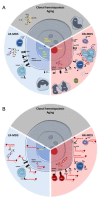From Immune Dysregulations to Therapeutic Perspectives in Myelodysplastic Syndromes: A Review
- PMID: 34829329
- PMCID: PMC8620222
- DOI: 10.3390/diagnostics11111982
From Immune Dysregulations to Therapeutic Perspectives in Myelodysplastic Syndromes: A Review
Abstract
The pathophysiology of myelodysplastic syndromes (MDSs) is complex and often includes immune dysregulation of both the innate and adaptive immune systems. Whereas clonal selection mainly involves smoldering inflammation, a cellular immunity dysfunction leads to increased apoptosis and blast proliferation. Addressing immune dysregulations in MDS is a recent concept that has allowed the identification of new therapeutic targets. Several approaches targeting the different actors of the immune system have therefore been developed. However, the results are very heterogeneous, indicating the need to improve our understanding of the disease and interactions between chronic inflammation, adaptive dysfunction, and somatic mutations. This review highlights current knowledge of the role of immune dysregulation in MDS pathophysiology and the field of new drugs.
Keywords: T-cell; immune; inflammation; myelodysplastic syndromes.
Conflict of interest statement
Thibault Comont received honoraria and/or research or educational support from AbbVie, AstraZeneca, Bristol Myers Squibb (Celgene), Novartis, and Takeda. All other authors have no conflict of interest to declare.
Figures

References
Publication types
LinkOut - more resources
Full Text Sources
Research Materials
Miscellaneous

